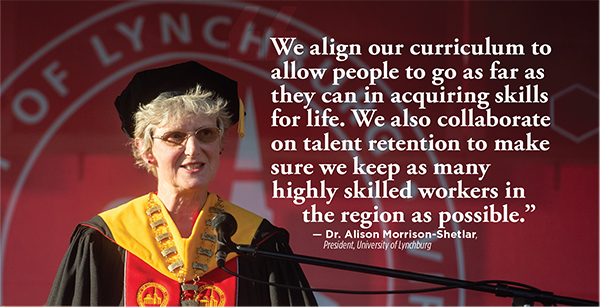The University of Lynchburg’s new president is no stranger to workforce development. Throughout her long and distinguished career in higher education, she has made talent development her mission.
“Colleges and universities are the pipeline for workforce talent development,” says Dr. Alison Morrison-Shetlar, president of 2,800-student University of Lynchburg in Lynchburg, Virginia. “We prepare people to be successful once they graduate.”
Over the course of a career that has taken her from Scotland to London and Germany and then on to Connecticut, Georgia, Florida, North Carolina and now Virginia, Morrison-Shetlar has had one constant: a belief that an institution of higher education should be the hub where people acquire the skills they need to be successful in life.
The Scotland native learned this at Dundee College of Technology (now Abertay University), the Max Planck Institute in Dortmund, Germany, Bochum University in Bochum, Germany, and the Kennedy Institute of Rheumatology in London.
Her considerable international experience is now being applied in South Central Virginia, where she collaborates with other institutions to build an ecosystem of talent development for the Lynchburg region as part of the Lynchburg Tomorrow initiative.
“We collaborate with the city, region and other educational institutions to make sure that all families have access to quality food, quality health care and skills training,” says Morrison-Shetlar. “We align our curriculum to allow people to go as far as they can in acquiring skills for life. We also collaborate on talent retention to make sure we keep as many highly skilled workers in the region as possible.”
The 118-year-old University of Lynchburg plays a critical role in meeting local workforce needs. The school is a go-to resource for nursing, health sciences, criminology, physical therapy, communications, English, art and design. And UL students learn by doing.

“Our Engaged Learning component means that every student is engaged in serving and lifting up the community,” says Morrison-Shetlar. “For example, we run the Free Clinic every Friday. We look at the whole person. We ask questions like, how can you get someone out of poverty? Everything we do in serving and equipping the community is aligned with the Lynchburg City Plan and the Lynchburg City Council.”
Free Community College? Yes
It is also aligned with the mission of nearby Central Virginia Community College. Dr. John Capps, president of 5,500-student CVCC, says the school founded in 1966 recently launched a career technical education academy to help the state fulfill its G3 mission — get a skill, get a job, get ahead. G3 offers students free community college tuition for training in high-demand fields.
The new Virginia scholarship program provides funding for tuition and textbooks, as well as a stipend, for qualifying students. Dr. Capps notes that 569 students at CVCC qualified for G3 assistance this year, and 188 took advantage of it. The program began July 1.
“We also received a GO Virginia grant to hire two people,” he says. “One was hired to make businesses in the community aware of the G3 program and other training programs offered at CVCC. The other was hired to build a website for the CTE Academy.”
CVCC also plays a role in worker training through its on-site STEM Academy. It’s called XLR8, and so far it has graduated 197 local students. The academy receives up to 855 applicants each year for 25 to 30 slots in the incoming class. “We have 30 juniors in the program this year,” says Susan Cash, director of the academy. “This program started in the 2013-2014 school year, and it has already produced a lot of success stories.”
Success Stories Abound
One graduate is a young woman who wanted to study health sciences, says Cash. After graduating from the STEM Academy at CVCC in Lynchburg, she went on to attend school at Virginia Military Institute and major in computer science. She now works for Northrop Grumman in Florida, where she has bought a house.
A male student wanted to be an engineer, notes Cash. He went on to get an industrial technology degree from Old Dominion University before being hired by Advanced Manufacturing Technology Inc. in Lynchburg.
Cash says Framatome, a nuclear engineering firm, and CloudFit, a cloud computing software development firm, also hire graduates of the STEM Academy. “Another one of our grads works for Kawasaki Racing,” she adds. “The sky’s the limit for these kids.”

